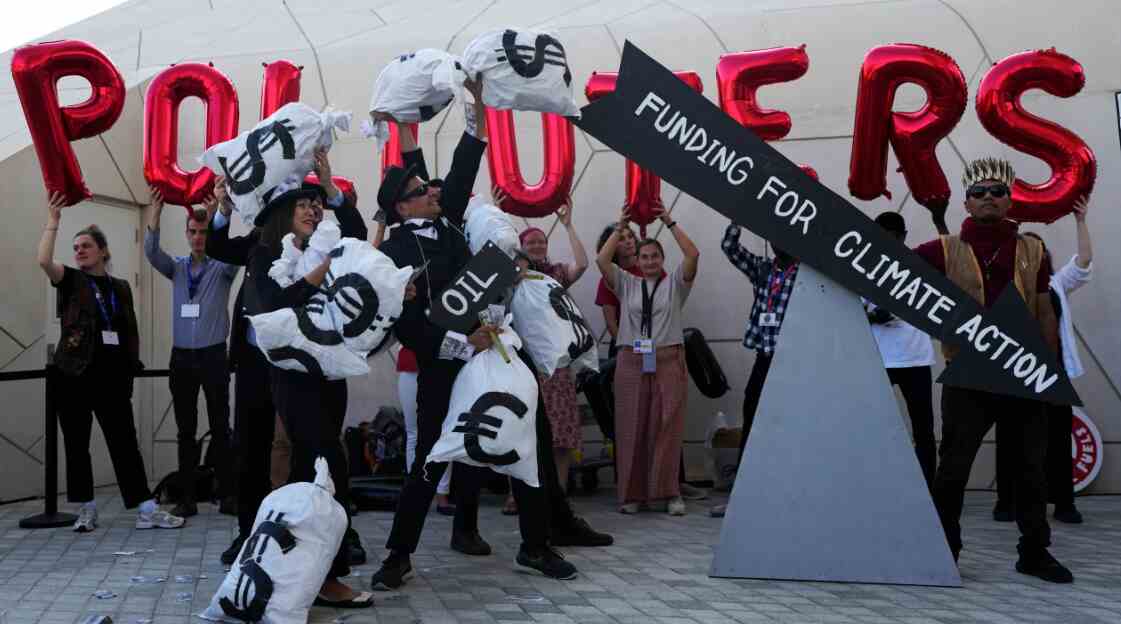
Poor nations require trillions of dollars to go green. An Extended Attempt Is Made to Bring in the Money
As the global community confronts the escalating challenges posed by climate change, a stark reality has come to the forefront: poor countries urgently need trillions of dollars to transition to green, sustainable economies. In a bold, yet daunting initiative, leaders from various nations are rallying for a concerted effort to generate the necessary funds, recognizing that the battle against climate change hinges on supporting the most vulnerable countries in their journey towards environmental resilience.
The financing gap for developing nations seeking to adopt eco-friendly technologies, renewable energy sources, and climate adaptation measures has become a major impediment to achieving global climate goals. The ambitious target set by the Paris Agreement to limit global warming to well below 2 degrees Celsius necessitates substantial financial commitments, particularly for countries that lack the resources to independently fund their green transitions.
The call for financial support was recently amplified during the COP26 summit held in Glasgow, where leaders and negotiators grappled with finding equitable solutions to address the challenges faced by developing nations. The summit highlighted the urgency of mobilizing funds to facilitate the transition to green economies and enhance the resilience of vulnerable communities to the impacts of climate change.
At the forefront of this long-shot effort is a proposal to generate the required trillions through a combination of public and private financing. The initiative seeks to tap into both traditional development assistance and innovative financial instruments to bridge the funding gap. However, experts acknowledge that navigating the complexities of financing climate action for developing nations is no easy feat.
One of the key elements of the proposal involves leveraging public funds to attract private investments. By de-risking green projects through public financial support, the hope is to create a more favorable environment for private investors. This approach aims to unlock the vast pools of capital held by private entities and redirect them towards sustainable, climate-friendly initiatives in the developing world.
Critics argue that relying on private investments may pose challenges, especially when it comes to ensuring that funds are directed towards projects that genuinely benefit local communities and contribute to sustainable development. There are concerns about the potential for profit-driven motives to overshadow the social and environmental objectives of climate finance.
Proponents, however, highlight the importance of engaging the private sector as a crucial partner in the global effort to combat climate change. Private investments can bring innovation, efficiency, and scalability to green projects, ultimately accelerating the transition to sustainable economies. The challenge lies in striking a balance that ensures responsible and impactful investments while meeting the financial needs of developing nations.
The proposal also emphasizes the role of developed countries in meeting their commitments to provide climate finance to developing nations. The pledge to contribute $100 billion annually to support climate action in developing countries, made a decade ago, remains unfulfilled. The COP26 summit aimed to reignite discussions around this commitment, with leaders recognizing the need to meet and surpass the $100 billion target.
The financing initiative also explores the potential of innovative financial instruments, such as green bonds and climate insurance, to mobilize additional resources. Green bonds, which are fixed-income securities designed to fund environmentally friendly projects, have gained traction in recent years. The proposal envisions scaling up the issuance of green bonds to attract investment for a wide range of climate initiatives, from renewable energy projects to sustainable agriculture.
Climate insurance, another innovative tool, aims to provide financial protection to vulnerable communities facing the increasing risks of extreme weather events. By developing insurance mechanisms, the initiative seeks to enhance the resilience of communities to the impacts of climate change, offering a safety net that can help them recover from climate-related losses.
Despite the ambition of the financing proposal, skepticism persists about the feasibility of generating trillions of dollars. The sheer scale of investment required to transition entire economies to green technologies and build climate resilience in vulnerable regions is a monumental task. Moreover, the challenges posed by bureaucratic hurdles, political will, and global economic uncertainties add layers of complexity to the endeavor.
The success of this long-shot effort hinges on the commitment of the international community to prioritize climate finance as a central component of global climate action. Developing nations, particularly those on the front lines of climate impacts, are counting on the world’s wealthiest nations to honor their pledges and step up their financial contributions.
As discussions continue on the intricate details of the financing initiative, it is clear that the journey towards generating trillions for climate action is an uphill battle. The world’s ability to confront the climate crisis will be defined by its collective commitment to supporting those most in need and ensuring that the transition to a green and sustainable future is a shared responsibility.
The coming years will undoubtedly test the resolve of nations and the effectiveness of the proposed financial mechanisms. The success of this long-shot effort will be a litmus test for the global commitment to address the profound challenges of climate change and build a more sustainable, equitable future for all. As the world grapples with the urgency of the climate crisis, the ambitious financing proposal stands as a testament to the recognition that the fight against climate change demands not just words but substantial, tangible commitments.
